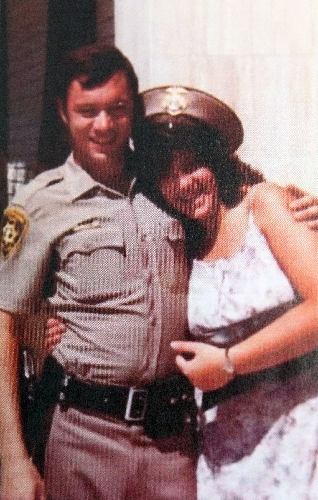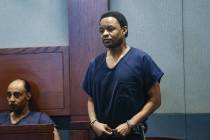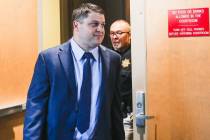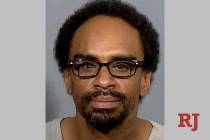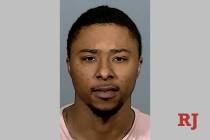Lawman sees 33 years slip by
Ray Flynn spent more than three decades working for Las Vegas police, but for one day in 1987, he was a doctor.
On a February night, then Sgt. Flynn was on patrol when a car flagged him down on Boulder Highway near Harmon Avenue. A frantic woman asked him for a police escort to a hospital because her passenger, a pregnant relative, was in labor.
Instead, Flynn called paramedics and had the pregnant woman lie on the backseat of the 1968 Rambler.
Before he knew it, the baby was crowning.
Little Angelina's birth certificate listed Flynn as the attending physician.
"That was a happy moment," Flynn said. "A moment I'll always cherish."
Flynn shared mostly fond - and some difficult - memories last week of his nearly 33-year career with the Metropolitan Police Department.
The 54-year-old retired from the agency as an assistant sheriff on Friday, a position he was appointed to in 2003 by then-Sheriff Bill Young.
He climbed the career ladder higher than he ever imagined he would, going from policing the streets to becoming a top level executive supervisor for his agency.
CHOOSING LAW ENFORCEMENT
When Flynn began his law enforcement career in 1980, Clark County had fewer than 500,000 residents. Officers worked foot patrols and, without cellphones, used "callboxes" on the streets to contact their supervisors.
For a long time, Flynn, a New Yorker raised in Queens, didn't know if his dreams of becoming a police officer would materialize.
He decided as a teenager he wanted to be a cop. But in the early 1980s, not many departments were hiring. He tested with 11 agencies in New York and New Jersey and was placed on waiting list after waiting list.
As a college student in New York City, where he was working as a department store security guard equipped only with handcuffs, Flynn heard the Las Vegas police department had openings. He tested for a position during spring break. Six weeks later, he was told he would have a job if he could get to the desert in four days.
Flynn now had a badge and a gun to go with his handcuffs.
Not long after, he learned how valuable that gun was.
DEADLY CONFRONTATION
On Feb. 10, 1982, Flynn was put in a position most officers detest. He faced an armed suspect who forced him to make a split-second decision.
That night, he and his sergeant responded to a domestic violence call that quickly turned dangerous.
Flynn and his supervisor arrived at a downtown public housing unit and found a woman who had escaped her estranged husband after being beaten with a liquor bottle.
Flynn and his sergeant confronted the man, who had his young son at his side.
The sergeant tried to grab the man, who escaped and cocked a gun at his head. Flynn shot twice at the man, who fired multiple rounds back.
"He shot the button off my winter coat," said Flynn, who was wearing a bulletproof vest.
Flynn killed the suspect.
Neither the boy, the sergeant nor Flynn were harmed.
He received a medal of honor for the shooting. He said he was protecting his sergeant.
"I'm not proud that occurred by any means," Flynn said. "It was just something that happened in my career."
Flynn was back on the job the day after the shooting, which haunted him in nightmares for about two years.
Now after on-duty shootings, police are required to see mental health experts who deem when officers are mentally fit to return to work.
Flynn went on to work or supervise nearly every aspect of department operations in his career.
He worked patrol and SWAT. He was a crisis negotiator, oversaw gang units, and was a sergeant for the K-9 unit. He was a tactical officer, training recruits for the police academy, and rode a motorcycle as a traffic unit lieutenant.
He was also the department's lead lobbyist in Carson City in 2007.
The only unit he didn't work or oversee was vice and narcotics.
The K-9 unit brought him the most thrills.
"They gave me a well-trained dog," Flynn said. "They told me to hunt bad guys."
As a crisis negotiator in the mid-'80s, he responded to a bank robbery at Twain Avenue and Maryland Parkway.
A man in the bank claimed to have a bomb strapped to him. He demanded $1 million, a 747 jet and a meeting with the queen of England.
After four hours, the man surrendered for much less: a Big Gulp and a hug.
Flynn said some SWAT officers were surprised by the hug, but Flynn said he made a promise, and negotiations are based on trust.
Clark County Sheriff Doug Gillespie said Flynn has never been a yes man.
He never had qualms about disagreeing with the sheriff and forcing him to rethink critical decisions.
Gillespie said a person like Flynn can't be replaced because of all his "institutional knowledge."
"He's a big part of my team," Gillespie said. "He's been a big part of my tenure as sheriff as well as my career."
Perhaps one reason Flynn had no problem challenging Gillespie is because Flynn has been Gillespie's boss.
Flynn was Gillespie's sergeant when Gillespie was a patrol officer. Gillespie also was a SWAT lieutenant while Flynn was his captain.
Gillespie said he will miss Flynn's sense of humor. But there are things about his retired assistant sheriff he can do without.
Gillespie said Flynn had a penchant for wearing shirts he had picked up at law enforcement conventions through the years. "I won't miss his polo shirts he liked to wear on Fridays."
CRITICAL ISSUES REMAIN AS FLYNN DEPARTS
Flynn's departure comes as serious issues face the Metropolitan Police Department.
The biggest threat to the department is its $46 million budget deficit, he said. Since the beginning of the recession, the Police Department's revenue has dropped about 33 percent, or nearly $61 million annually.
In recent years, Gillespie has used reserve funds to cover the shortfall. He has also cut about 500 police and civilian positions and wrung concessions from unions representing department employees.
With reserves depleted in Clark County and Las Vegas, the department's biggest funding sources, Gillespie doesn't know if they can deliver the tens of millions of dollars he needs to cover his agency's projected shortfall.
The department's budget woes have even hit the executive staff. Gillespie said Flynn's position won't be filled. The remaining assistant sheriffs will split Flynn's duties.
According to the Transparent Nevada website, Flynn earned a base salary of about $178,760 in 2011.
Flynn also helped tackle an issue that raised the public's ire and caused the U.S. Department of Justice to intervene: on-duty police shootings.
Federal officials made dozens of recommendations after Las Vegas police had two consecutive years of on-duty shootings that tied or set records. In 2010, the department had 25 shootings, tying its high. In 2011, a record 12 people were fatally shot by police.
Flynn said most of the justice department's recommendations revolved around better training. He said the agency has acknowledged the issue and will take heed.
Most encounters civilians have with police are positive, Flynn said. On average, officers have more than 1 million in-person encounters with the public per year, with only a small minority resulting in use of force instances or shootings, Flynn said.
However, he acknowledged that some view Las Vegas police in a negative light. He said the public has every right to question police after shootings.
"We are policing in a democracy," Flynn said. "We are only as good as the community supporting us."
'MENTOR' WILL BE MISSED
For the past year and half, Flynn oversaw two divisions that included detectives, the gang unit, the traffic bureau, the agency's dispatch and 911 functions, McCarran International Airport officers, K-9, the search and rescue unit and air support units.
Assistant Sheriff Greg McCurdy, now one of three people with that title in the department, described Flynn as a "mentor." Flynn was McCurdy's boss three times during his career.
"He's provided me a lot of guidance," McCurdy said.
He said Flynn was the go-to guy on the executive staff when it came to tracking information on the Internet about the latest police procedures or news in the law enforcement world.
"He was always the kind of guy to stimulate thought," McCurdy said. "I look forward to continuing our friendship. I won't hesitate to call him."
With 14 years of graveyard and swing shifts behind him, retirement will make Flynn a "better husband and father."
Policing took him away from many holidays, soccer games and birthdays.
He looks forward to traveling with his wife Linda, the high school sweetheart he married shortly after becoming an officer.
His four children are adults, ranging in age from 23 to 31, and he has one grandchild.
One of his sons followed in his footsteps and has worked as a Las Vegas police officer for eight years.
Flynn, who has a bachelor's degree in criminal justice and a master's in administration of justice earned through online universities, said he will consider teaching criminal justice at a local college. But for now, he hopes to improve his cooking skills and increase his time on the water, deep-sea fishing.
"I'm as proud of this department as the day I hired on," Flynn said. "I'm going out happy. I'm going out enjoying this job."
Contact reporter Antonio Planas at aplanas@reviewjournal.com or 702-383-4638.




